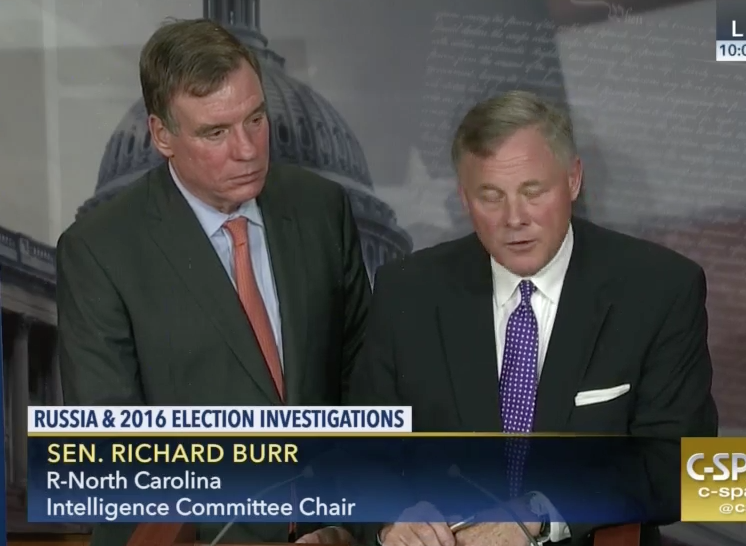The Problems with Richard Burr’s Claim that SSCI Has No Evidence of Collusion
Fresh off a really testy statement suggesting that he is one of just two acceptable gatekeepers on the question of whether Trump conspired with Russia, Richard Burr made some comments to the AP over the weekend suggesting his committee had not received any evidence of a conspiracy between Trump and Russia.
Burr said there is “no factual evidence today that we’ve received” on collusion or conspiracy between Russia and President Donald Trump’s campaign.
It’s a squishy statement that seems designed — particularly given Burr’s newfound lassitude about ending the inquiry and his stated worries of being accused of missing something in the future — to permit him to sustain a claim he hasn’t seen any conspiracy, at least through the election, without aggressively investigating for one.
“Nothing in this town stays classified or secret forever,” Burr said. “And at some point somebody’s going to go back and do a review. And I’d love not to be the one that chaired the committee when somebody says, ‘well, boy, you missed this.’ So we’ve tried to be pretty thorough in how we’ve done it.”
[snip]
Still, he says he doesn’t think the committee should rush to wrap up the work, saying “the worst thing we can do is to prematurely try to end” the probe.
Indeed, the rest of this article lays out plenty of evidence that Burr is not looking for evidence of a conspiracy. First, there’s the description of what his committee has been working on most recently:
For now, Burr says, the committee is preparing to put out two reports by the end of September: one on the Obama administration’s response to Russia’s election interference, and a second on Russia’s election meddling on social media. The committee is also expected to hold a hearing with Facebook COO Sheryl Sandberg and Twitter CEO Jack Dorsey in the first week of September.
Along with prior work and that laid out in that prior work, then, the Burr interview reveals that SSCI has been focused on:
- A review of the January 2017 Intelligence Community Assessment
- A report on election security vulnerability that barely mentions election vendor security
- The planned report on Obama’s response to the Russian attack
- The planned (and laudable) report on disinformation on social media
- Per a bullet in the ICA report, “the contents of the [Steele dossier and its] handling by the United States Government “
These are all worthwhile topics (if you ignore the absence of a focus on vendors in the election security report). They’re just tangential to any question of conspiracy between Trump and Russia.
And on the one area where Burr does mention that conspiracy, he makes it clear he’s not going to work too hard to find out the truth.
“If the intent is to have a show trial, I’m not a participant,” Burr says on public hearings. He says “I don’t see a reason today” to bring back Donald Trump Jr., the president’s son, who participated in a meeting with a Russian lawyer at Trump Tower during the election.
At least at the House Intelligence Committee interview Don Jr had in December, the President’s son professed to not recall whether a call to a blocked number looped in his father on discussions about the June 9 meeting. And Mark Warner has made it clear that the committee did not ask Don Jr about a later meeting where he proved willing to accept election assistance from foreign entities. Don Jr’s SJC testimony on that point is, by all appearances, a false statement to Congress. So the public record, at least, suggests that no committee has worked through the holes in Don Jr’s story — even ignoring some of the other questions remaining in the public record. Yet Burr likens chasing down those details to “a show trial.”
So, even with what’s in the public record, there’s significant reason to question whether Burr’s claim that “no factual evidence today that we’ve received” shows a conspiracy between Trump and Russia reflects any real effort to find out if there was one.
Plus, the article makes it clear that Burr doesn’t just demand that witnesses to the committee, but even other Senators, remain utterly silent about what the committee has been doing.
Sen. Jim Lankford of Oklahoma, who sits on the intelligence panel and is close to Burr, says Burr started every meeting at the beginning of the probe by asking senators not to talk to the media “until we get additional facts and we put things out together.”
While I greatly appreciate the need to keep the substance of some things the committee is doing a secret (indeed, I find that the committee doesn’t leak like a sieve refreshing), Burr’s public refusal to chase down the Don Jr story and his unwillingness to allow any public comment about what the committee is doing raise real questions about whether the committee would chase down evidence that would support a conspiracy case — even formerly public information still accessible to Congress, much less records requiring more of an effort to obtain — that might prove the same. Burr might worry just as much about someone, in the future, pointing to proof the committee chose not to chase down leads about a Trump-Russian conspiracy as his stated concern about someone pointing to something the committee missed.
“I know that from a committee’s integrity standpoint we’ve got to prove what we find. And if you can’t prove it then we can’t make the claim,” Burr said in the interview. But if his committee is not trying to prove that a conspiracy with Russia exists, then he should stop claiming that the committee has received no factual evidence that such a conspiracy exists. He would simply be unqualified to make the claim one way or another, and so should stop suggesting he would know if there were a conspiracy.
This is why I complained — before Burr made these comments — about his problematic epistemology, his insistence that he is one of just two gate-keepers on a claim about whether or not there has been collusion. Even the public record suggests no one in the committee can make such a claim.
As I disclosed last month, I provided information to the FBI on issues related to the Mueller investigation, so I’m going to include disclosure statements on Mueller investigation posts from here on out. I will include the disclosure whether or not the stuff I shared with the FBI pertains to the subject of the post.



